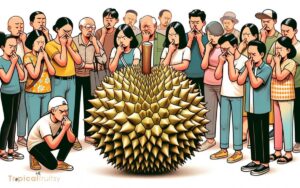Another Name for Durian Fruit: King of Fruits!
Durian fruit is also sometimes referred to as the “King of Fruits” due to its distinctive size, strong odor, and formidable thorn-covered husk.
The durian is a tropical fruit distinguished by its large size, unique odor, and spiky, hard outer shell.
It is native to Southeast Asia, where it is widely appreciated for its rich, custardy taste despite the strong, often repulsive, smell that has led to its banishment from many hotels and public transports in the region.
Known for its high nutritional value, the durian is packed with vitamins, minerals, and beneficial fats.
An example of durian’s polarizing nature is its presence in Southeast Asian markets where it’s either loved for its taste or avoided due to its pungent smell.
Despite its controversial aroma, durian fruit is a beloved delicacy in Southeast Asia, cherished for its unique flavor and nutritional benefits.
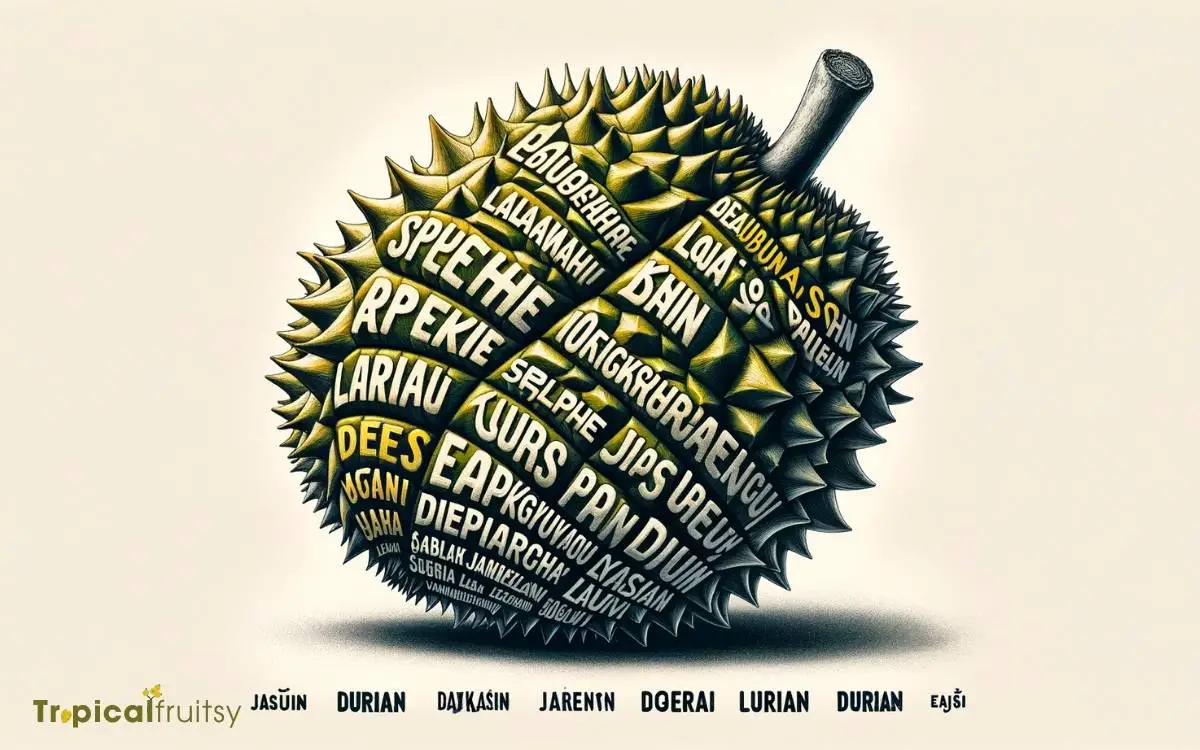
Key Takeaway
The term ‘Civet Fruit’ reflects the durian’s distinctive aroma and evokes strong reactions of either adoration or aversion.
This reflects the local reverence for the fruit and provides insight into the cultural tapestry where the durian is celebrated.
The “Stink King” Epithet
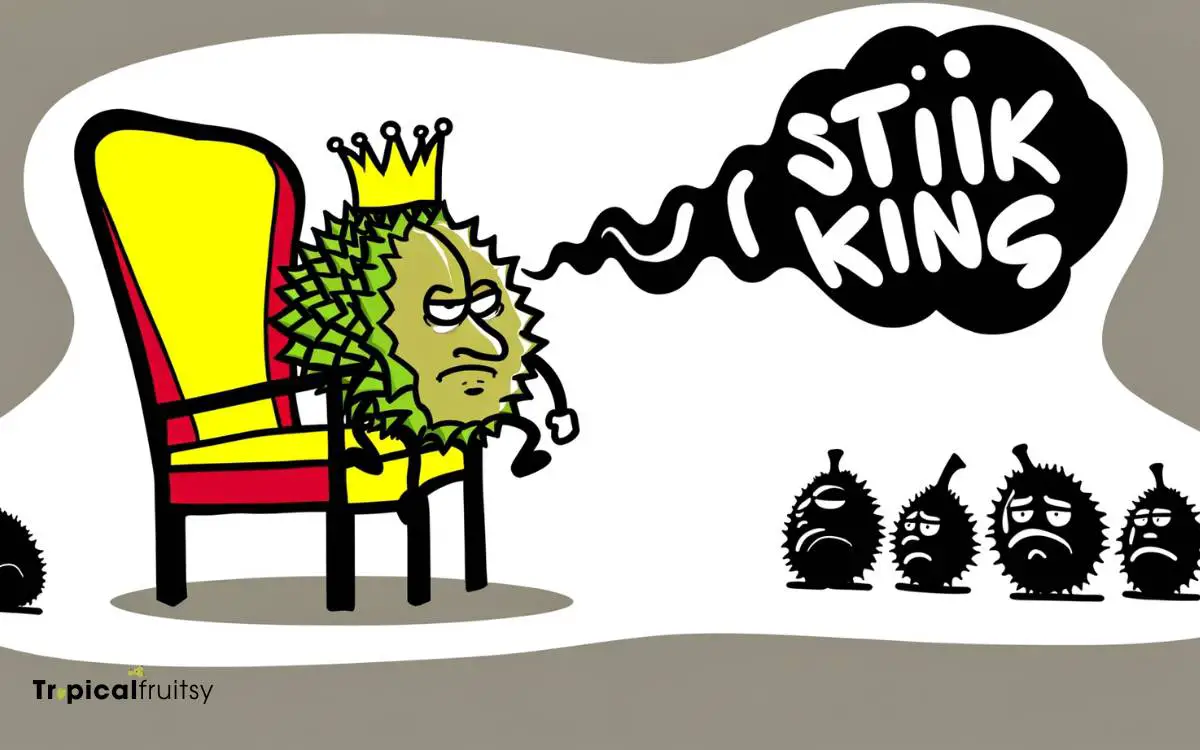
Although durian fruit is revered for its taste by many, it has been dubbed the ‘Stink King’ due to its notoriously pungent odor.
This moniker captures the essence of the visceral reaction many individuals have upon their first encounter with the fruit’s aroma.
Descriptions vary widely, yet common comparisons include notes of rotten onions, raw sewage, and sulfur.
This distinct smell, so powerful it permeates through the thick, spiky husk, has even led to the fruit’s banishment from certain public spaces, such as hotels and mass transit systems in Southeast Asia.
One might wonder, what compounds are responsible for this olfactory assault? And how do aficionados look past the scent to appreciate the fruit’s complex flavor profile?
These questions hint at the durian’s enigmatic nature, captivating and repelling in equal measure.
Cultural Monikers Unveiled
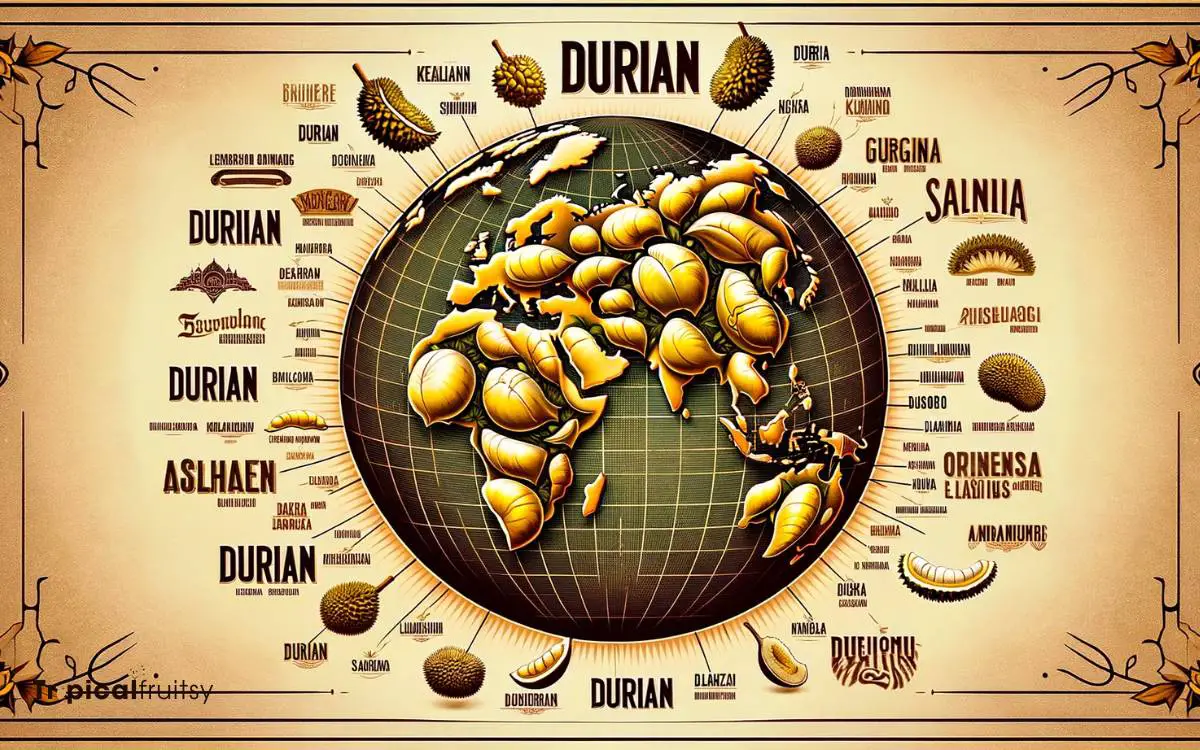
Exploring the diverse cultural monikers of durian fruit reveals its significant impact on various societies and their languages.
Often called the ‘king of fruits’ in Southeast Asia, the durian’s presence resonates through nomenclature that reflects both reverence and humor.
In Malay, it is known as ‘durian’, derived from the word ‘duri’, meaning thorn, highlighting its formidable husk. The Indonesians mirror this term, suggesting a shared cultural appreciation.
Thailand’s ‘thu-rian’ acknowledges the fruit’s status with a title that conveys both exoticism and familiarity, while in Vietnam, it is ‘sầu riêng’, which poetically translates to ‘private sorrow’, perhaps alluding to its polarizing aroma.
Each epithet, a mosaic of linguistic ingenuity, unveils a deep-seated recognition of the durian’s complex place in the gastronomic and cultural tapestry of the region.
Civet Fruit”: A Local’s Choice
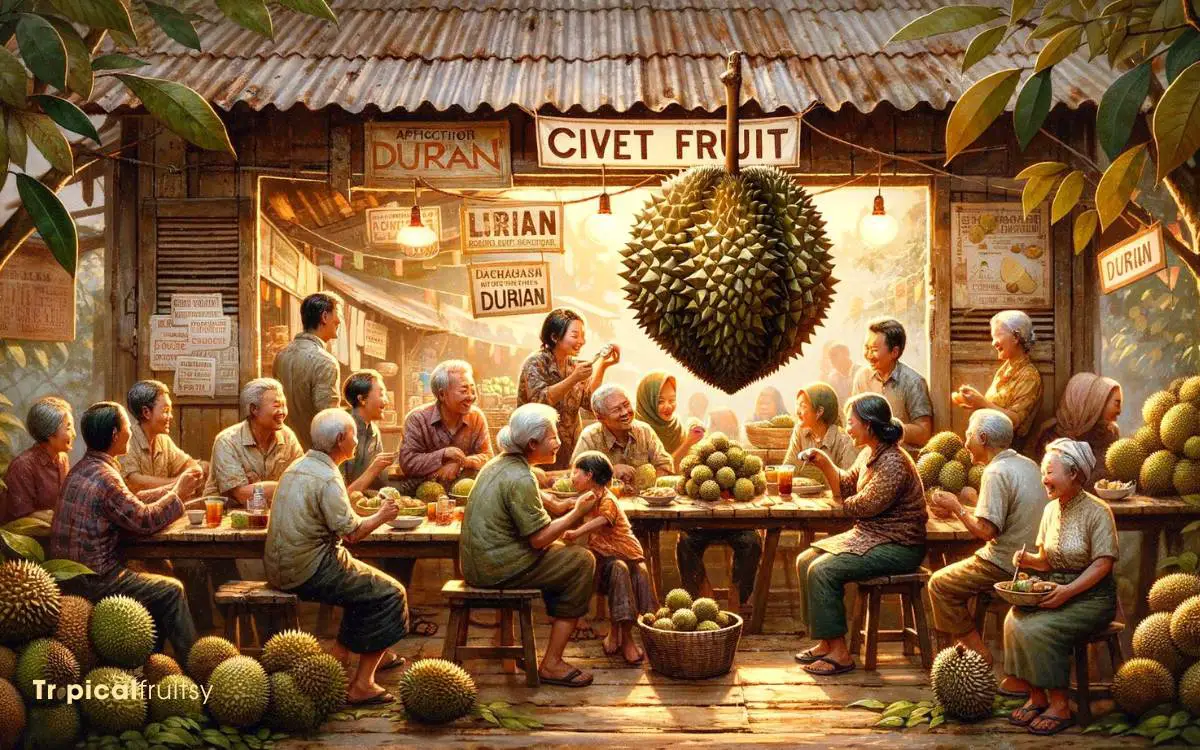
Delving into local vernacular, the durian is sometimes affectionately referred to as ‘Civet Fruit’, a nod to its distinctive, pungent scent that is reminiscent of the civet animal’s odor.
This moniker is not merely a whimsical comparison but rather an emblematic designation steeped in the sensory experience that durian evokes.
The parallel drawn between the fruit and the musk-laden civet encapsulates a complex relationship, one where intrigue and aversion coalesce.
Connoisseurs of this tropical delicacy, undeterred by the initial olfactory assault, find themselves drawn to the paradoxically rich and creamy flesh that lies beneath the spiky exterior.
Astute observation reveals that the term ‘Civet Fruit’ conveys a sense of pride and endearment, signifying a local preference and an acquired taste that bonds communities through shared culinary heritage.
The Linguistic Roots

The term ‘Civet Fruit’ originates from a complex interplay of linguistic influences and cultural associations with the durian’s distinctive aroma.
As we delve into the etymology of this moniker, we uncover a rich tapestry of words that mirror the intricate nature of this enigmatic fruit. The linguistic roots are as tangled and deep as the durian’s own history in Southeast Asia.
- The scent of controversy: evoking strong reactions of either adoration or aversion.
- A whiff of history: connecting past cultures with our present through language.
- The aroma of identity: signifying a sense of place and belonging.
- A gustatory puzzle: challenging the uninitiated to reconcile its pungent odor with its custardy taste.
- An olfactory enigma: stirring curiosity and intrigue about its unique characteristics.
Each term captures a facet of the durian’s complex identity, inviting a deeper understanding and appreciation of this polarizing fruit.
Thorny Heaven” in Dialects

Several regional dialects affectionately refer to the durian as ‘Thorny Heaven’, highlighting the fruit’s spikey exterior and heavenly taste.
This moniker encapsulates the intriguing dichotomy of the durian experience: a formidable, thorn-covered husk guarding a rich, custard-like interior that exudes a complex aroma.
Devotees of this tropical delicacy are well acquainted with the sharp contrast between its foreboding appearance and the rewarding flavor that awaits within.
The term ‘Thorny Heaven’ is a testament to the local reverence for the fruit and offers insight into the cultural tapestry where the durian is celebrated.
It invites one to ponder the sensory paradoxes that often accompany prized culinary wonders, and to appreciate how language can vividly capture the essence of regional gastronomy.
Global Nicknames Explored
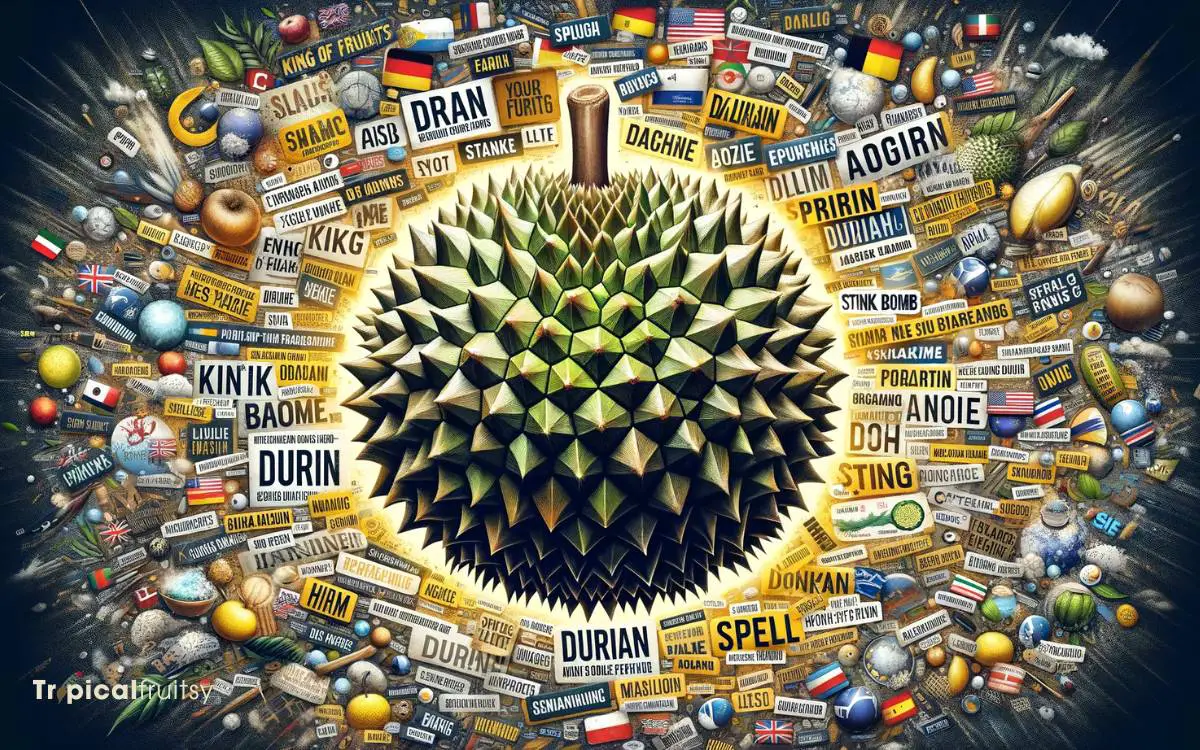
Around the world, durian is often whimsically dubbed ‘The King of Fruits,’ a name that speaks to its esteemed status among connoisseurs and the general populace alike.
This regal moniker, however, is just one of the many names that capture the essence of this polarizing produce.
Here are some global nicknames that reflect the diverse perceptions and emotions stirred by the durian:
- Stinkfrucht (Germany): Evoking a visceral reaction to its potent aroma.
- Civet Cat Fruit (Indonesia): Hinting at its pungent, animalistic scent.
- Tropical Thistle (Australia): Alluding to its formidable, spiky exterior.
- Pungent Delight (Malaysia): A nod to the love-hate relationship many have with its flavor.
- Thorn King (Thailand): Emphasizing its royal status and formidable defense.
These names, laden with imagery and sentiment, reflect the complex cultural tapestry woven around the durian’s controversial charm.
Durian Scientific Name and Family
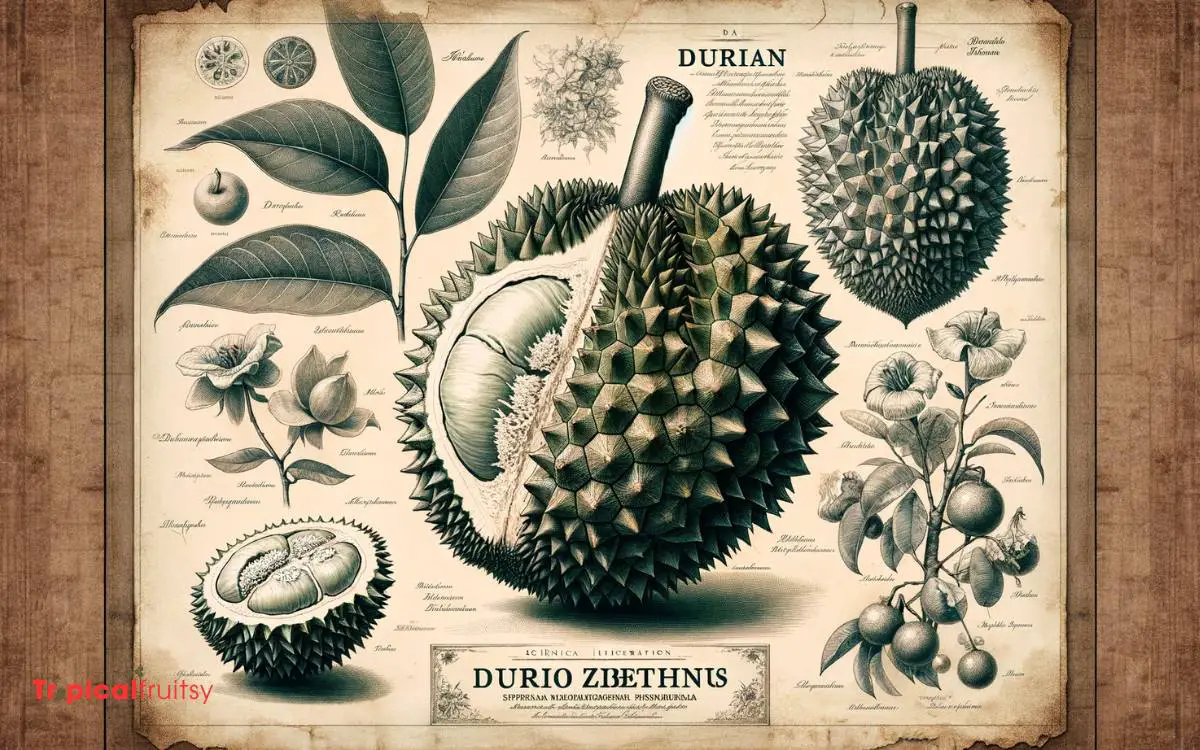
The scientific name of the durian is Durio, and it belongs to the family Malvaceae, although it was formerly classified in the family Bombacaceae.
The durian is a tropical fruit known for its strong odor and distinctive taste, often referred to as the “king of fruits” in Southeast Asia.
Certainly, here are more details about the scientific name and family of the durian fruit:
Scientific Name:
- Genus: Durio
- Species: There are numerous species of durian, with Durio zibethinus being the most widely cultivated and well-known species.
- Common Name: Durian
Family:
The durian belongs to the family Malvaceae. However, it’s worth noting that the classification of the durian has undergone some changes over the years.
It was previously classified in the family Bombacaceae, but taxonomic revisions have since placed it in the Malvaceae family.
The Malvaceae family is also known as the mallow family, and it includes various flowering plants, some of which produce edible fruits.
The durian tree, scientifically known as Durio, is native to Southeast Asia and is known for its large, spiky fruit with a strong and distinctive smell.
The fruit is famous for its unique combination of flavors, which some people find delicious and others find unpleasant due to its pungent odor.
Durians are often used in various culinary applications, including desserts, candies, and savory dishes, especially in Southeast Asian cuisine.
Conclusion
In the tapestry of global cuisine, the durian stands as an emblem of cultural dichotomy, revered and reviled in equal measure.
Its myriad names encapsulate a world of sensory extremes, from olfactory challenges to gustatory delights.
In every epithet, from ‘Stink King’ to ‘Thorny Heaven,’ lies a testament to humanity’s multifaceted relationship with nature’s bounty, reflecting the fruit’s indelible mark on the palate of global tradition.
The durian, in all its aromatic complexity, remains an enigmatic symbol of nature’s paradoxical gifts.






